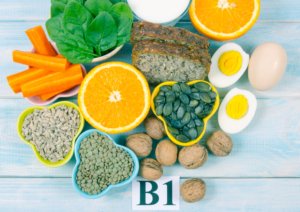Vitamin B1 counteracts alcohol-induced dementia
 Alcohol is one of the most compromising factors when it comes to public health, and alcohol abuse comes at an enormous cost, both to the individual and to society. A large alcohol consumption contributes as a factor to insidious dementia, but according to a new study from Taiwan, supplementing with vitamin B1 (thiamine) may prevent alcohol-induced dementia. The scientists that have conducted the study therefore point to vitamin B1 supplementation as having an important role in the treatment plan for people with alcohol abuse problems and to prevent dementia from developing or progressing.
Alcohol is one of the most compromising factors when it comes to public health, and alcohol abuse comes at an enormous cost, both to the individual and to society. A large alcohol consumption contributes as a factor to insidious dementia, but according to a new study from Taiwan, supplementing with vitamin B1 (thiamine) may prevent alcohol-induced dementia. The scientists that have conducted the study therefore point to vitamin B1 supplementation as having an important role in the treatment plan for people with alcohol abuse problems and to prevent dementia from developing or progressing.
Dementia is a term for different symptoms of failing brain function and is primarily characterized by poor memory and impaired ability to function in daily life. Dementia is often insidious, and to begin with, it may be difficult to determine if it is rooted in disease. Many chronic ailments such as Alzheimer’s disease and Parkinson’s disease may lead to dementia for varying reasons. Long-term alcohol abuse can cause chronic poisoning of the brain that often vanishes as soon as the person stops drinking. However, many people sustain irreparable damage, which is primarily a result of lacking vitamin B1. Potentially life-threatening conditions may also occur.
|
Study methods and results
The team of researchers from Taiwan collected data from a large cohort study called the Longitudinal Health Insurance Database 1995-2000. One group consisting of 5,000 participants was diagnosed as being alcoholic and was treated with vitamin B1 supplements, while another group that also consisted of around 5,000 alcohol abusers did not receive vitamin B1 supplements. The scientists adjusted for factors such as demography, age, gender, medicine consumption etc. and found that there was a lower rate of dementia in the group that was treated with vitamin B1. The researches also employed the so-called Kaplan-Meier analysis that shows the expected lifespan under given circumstances. According to this analysis, the alcoholics that took vitamin B1 supplements have a lower risk of developing dementia, a condition that is already known to reduce life expectancy.
On behalf of their observations, the scientists concluded that vitamin B1 supplements are important for preventing alcohol-induced dementia from occurring or getting worse. It is even possible that vitamin B1 supplements may reduce other types of damage as a result of drinking too much a single evening or for a brief period.
Facts about vitamin B1
|
Reference intake level, increased need, and supplementation
The reference intake (RI) level is 1.1 mg, which is what most multivitamins contain, but there is increased need with alcoholism, stress etc. Vitamin B complexes with all the different B vitamins and mono preparations, however, many contain vitamin B1 in levels that exceed the RI level by more than 1,000 percent. There are no known side effects, and vitamin B1 can be ingested in rather large quantities without problems. The vitamin is water-soluble, which means that excess intake is excreted with the urine without causing poisoning.
In people who receive several injections of the vitamin, allergic reactions may occur from time to time.
Is it possible to waste your brain with alcohol?Technically yes – to some degree |
Alcohol also depletes the body’s vitamin C levels
Other studies show that alcohol abuse even depletes the body’s vitamin C levels, but supplements are likely to benefit the health of alcoholics. It is even possible that vitamin C supplements may reduce the damage of drinking too much for a short period, according to a review article that is published in BMJ Nutrition, Prevention & Health.
References:
Chou W-P, Chang et al. Thiamine for preventing dementia developing among patients with alcohol use disorder: A nationwide population-based cohort study. Clinical Nutrition 2019; 38 1269-73
Daniel James Lim et al. Vitamin C and alcoholics: a call to action. BMJ Nutrition, Prevention & health 2018
https://netdoktor.dk/sygdomme/fakta/demens.htm
https://sundhedsdatastyrelsen.dk/da/tal-og-analyser/analyser-og-rapporter/andre-analyser-og-rapporter/alkoholstatistik
Search for more information...
- Created on .








